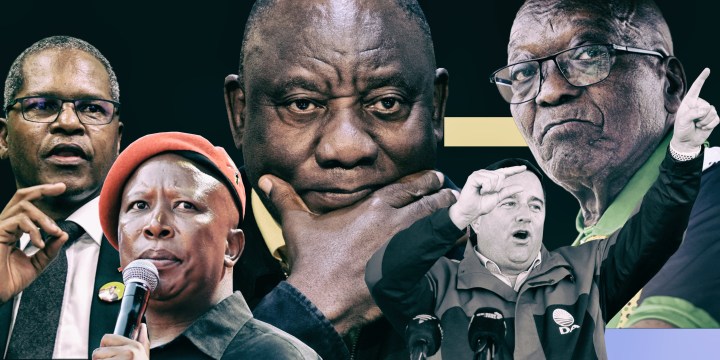ROAD TO 2024 ELECTIONS
Coalitions, seismic provincial politics will shape Ramaphosa’s post-2024 term, analyst tells Press Club

Coalitions following the 2024 elections could depend on just a few seats’ difference, with much depending on provincial party political support, Krutham analyst Peter Attard Montalto told the Cape Town Press Club on Monday.
‘It is the first real election in South Africa where we have to think about coalitions (and negotiations between parties),” said Krutham analyst Peter Attard Montalto. “Turnout is incredibly important. A percentage point can have a huge impact.”
However, even as the ANC was expected to lose around 2 million votes, President Cyril Ramaphosa was unlikely to immediately leave office.
“We are less concerned by him being ousted by forces in the party than him leaving by himself,” said Attard Montalto, adding no one else of national standing was available to step in despite speculation around Electricity Minister Kgosientsho Ramokgopa and Justice Minister Ronald Lamola.
“There is no succession planning.”
It was likely to get messy if the ANC obtained less than 46% to 47% in the 29 May elections – the threshold where an ANC-led government with small parties was no longer possible. ANC voting support of 45% or less meant “more complex” coalition discussions.
“We now care about the provincial elections,” said Attard Montalto, pointing to the impact of voter turnout in the provinces on the national post-election picture and, ultimately, coalition negotiations.
KwaZulu-Natal has emerged as central. The uMkhonto Wesizwe party (MK party) nibbled away at ANC and IFP support in recent by-elections, and could clinch as much as 4.6% of the national vote.
Read more in Daily Maverick: Zuma’s MK party takes votes from ANC, EFF in Mpumalanga debut on back of strong KZN showing
In the scenario of the ANC scoring less than 45%, a coalition with the IFP, which has its heartland in KwaZulu-Natal, alongside some smaller parties would carry the ANC into government. Although the IFP was part of the Multi-Party Charter it may well be persuaded to join the ANC in return, for example, for national posts, or the premiership of KwaZulu-Natal.
Dismissed as “a big misunderstanding” was the likelihood of an ANC EFF coalition, which Attard Montalto said “was not a first priority”. As political parties map out scenarios, a deal between the ANC and DA may well be higher ranked, although that meant for the DA to join, it would have to have “a pretty strong nose not to collapse it [the coalition] every time there’s a whiff of corruption”.
The most likely post-2024 poll scenario would be a national coalition of the ANC and IFP with some smaller parties. Less likely would be a coalition of the DA with smaller parties.
Krutham’s number crunching has the ANC obtaining 43.6% of the vote nationally, the MK party 4.6%, with EFF support flat and the DA increasing marginally. A post-2024 National Assembly would see a handful of seats for the Patriotic Alliance (PA) and seven or eight seats for Rise Mzansi. The Multi-Party Charter that still included the IFP would secure 146 National Assembly seats, well short of the required 201 majority.
While KwaZulu-Natal has emerged as central to the 2024 elections, Attard Montalto said that in Gauteng, the ANC was set to get between 36% and 37% and the DA 34%. This scenario needed “really complicated maths” regarding coalition and governance.
Read more in Daily Maverick: Latest poll shows ANC’s rocky road to election, with coalition potholes ahead
All this unfolded against an election campaign trail that didn’t really allow political parties and independents creative wiggle room, or claims at quick low-hanging fruit successes on the policy front.
“There is no magic idea,” said Attard Montalto. “We have to be clear, most of what needs to happen is already on the table.”
Political party manifestos largely reflect this. Jobs, economic growth and fighting crime and corruption are included in all manifestos released to date.
“It’s hard for a new government to rack up successes … in a classical 100 Days [in office].”
While key complex reforms are under way in sectors from logistics, including rails and ports, to bulk water and more, it was really up to voters. But Attard Montalto said it was still unclear how voters would respond across the board, “Will they switch votes, or stay away?” DM


















 Become an Insider
Become an Insider
There is no good outcome for this election. The country will either be saddled with the same old ANC (achieving nothing), a coalition of opposites (achieving absolutely nothing) or an unelected minority grabbing power.
Not sure why if the ANC loses around 2m votes, they would drop to 43.6%.
It depends on the turnout.
If you subtract 2 million votes from the votes the ANC got in 2019, with other variables(like total votes cast) left unchanged , the ANC would
have won 46.03% in 2019.
So, I guess that his numbers are based on an assumption that the turnout thus year will be higher
than in 2019.
Well, the voters roll has increased by slightly over 1.5 million voters since 2019, so that’s one reason to think that the turnout (in raw number of voters) may be higher too.
But as for the turnout in percentage terms, that’s the biggest question of them all. There are some opposing forces at work: On the one hand, one can sense a certain anticipation in the air among the middle class, the expectation that this will be a watershed election. On the other hand, there is the past and present voter apathy, especially among the ruling party’s base — how many disillusioned voters will stay away this time, and how many will decide to show up to change their vote after staying away last time?
We’ll probably only know after election day which one of these trends will win out.